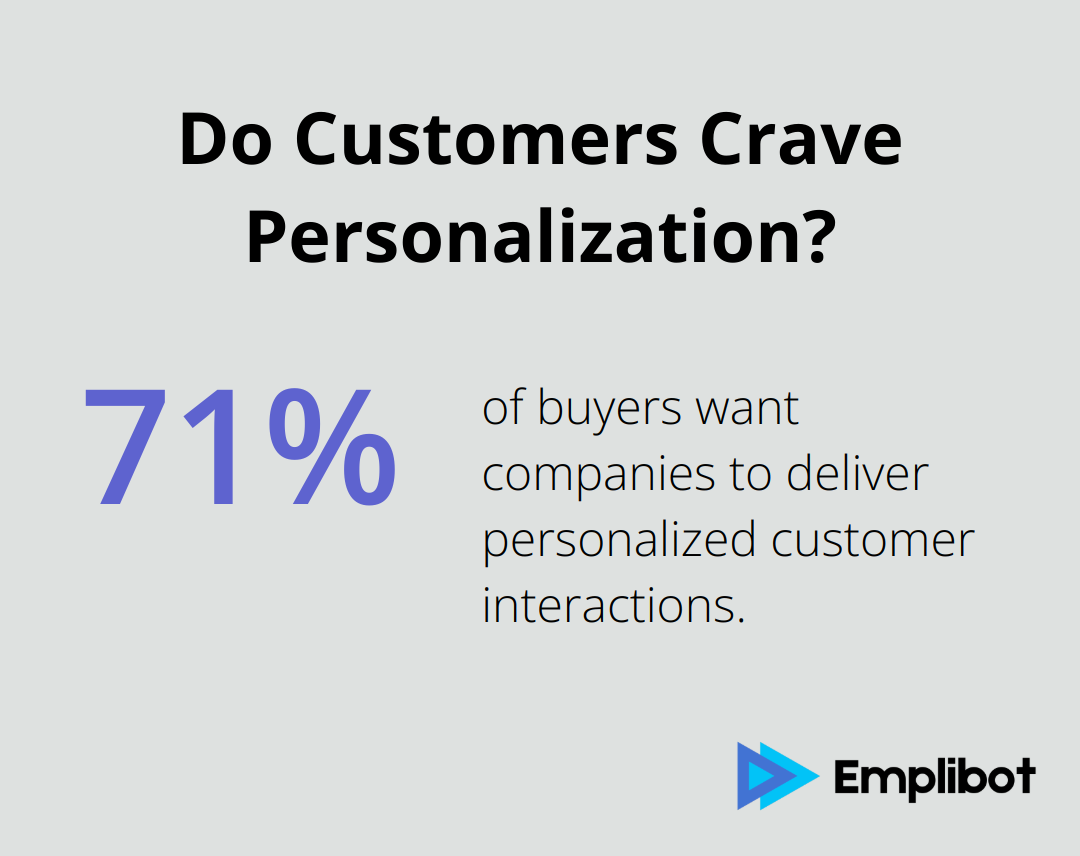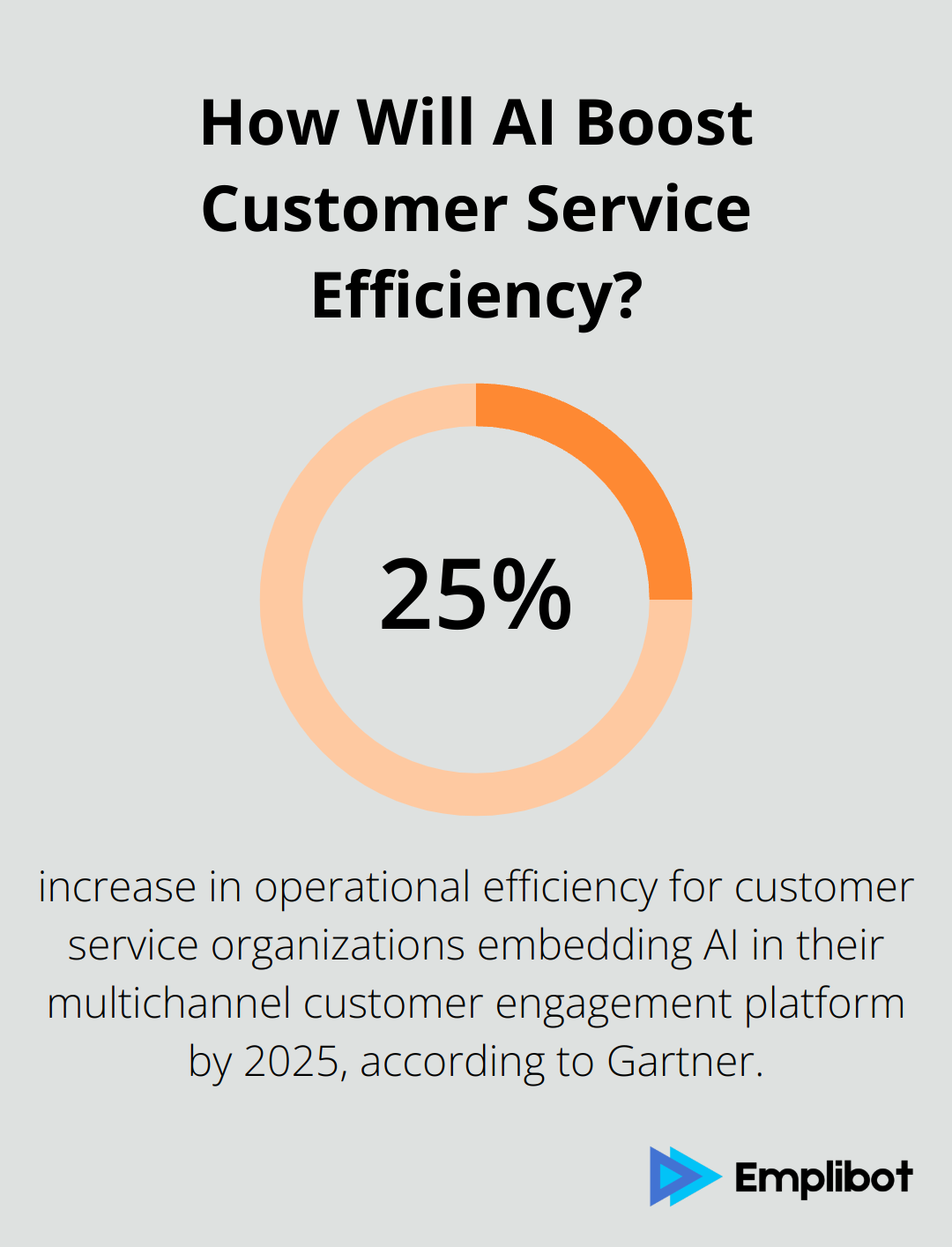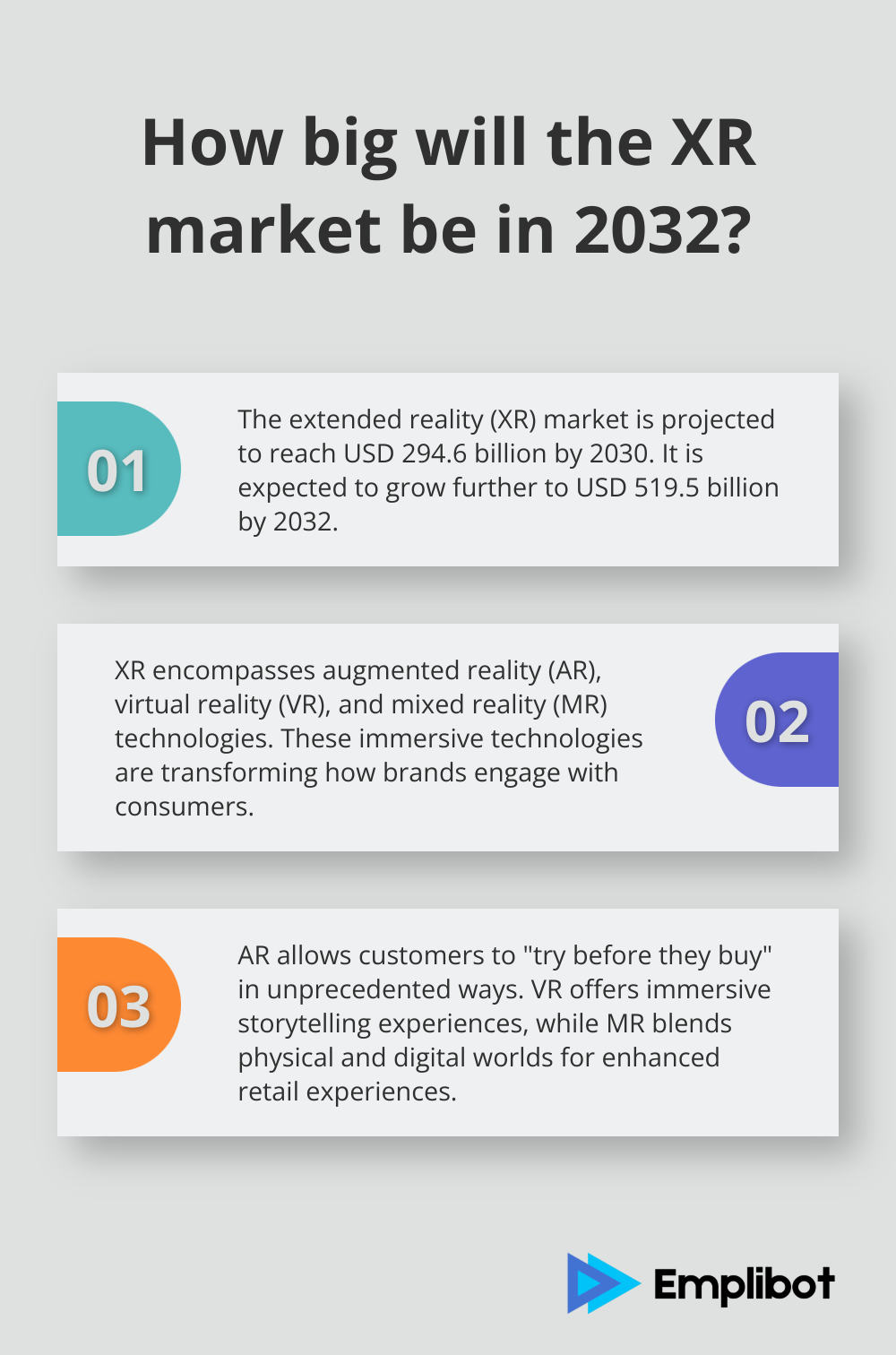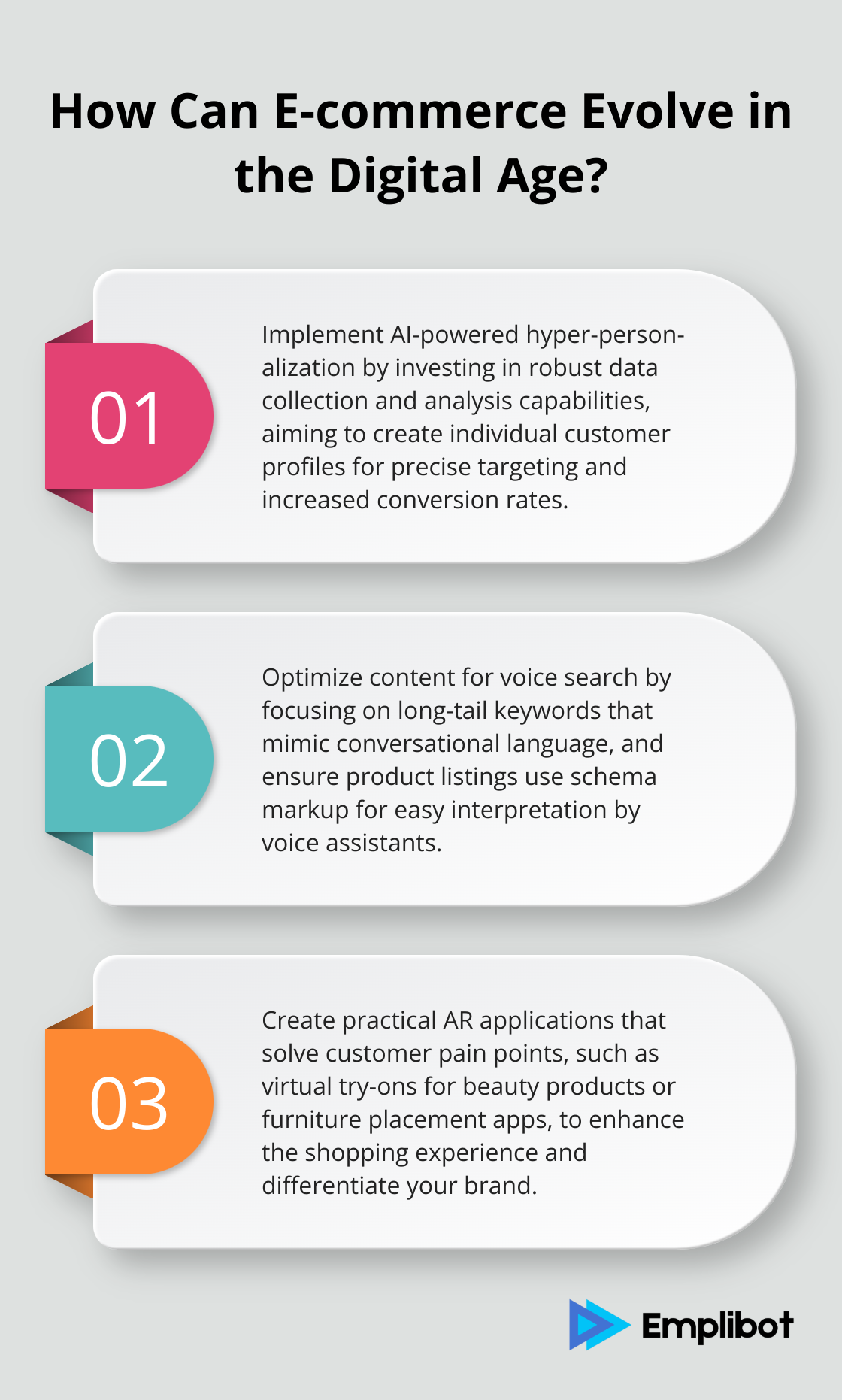The future of digital marketing is rapidly evolving, and 2025 promises to be a game-changing year. At Emplibot, we’ve analyzed emerging trends and technologies to bring you our predictions for the coming year.
Get ready for a marketing landscape dominated by AI, voice search, and immersive technologies that will revolutionize how brands connect with their audiences.
Contents
ToggleHow Will AI Transform Personalization?
The New Standard: Hyper-Personalization
AI-powered personalization will become the cornerstone of successful digital marketing strategies in 2025. Hyper-personalization will set the new standard, with 71% of buyers wanting companies to deliver personalized customer interactions. This shift will revolutionize how businesses connect with their audiences, creating more meaningful and impactful interactions.
Individual-Level Marketing Takes Center Stage
The era of broad demographic targeting will end. AI algorithms will analyze vast amounts of data to create individual customer profiles, enabling marketers to craft messages that resonate on a personal level. This precise targeting will lead to an increase in conversion rates for businesses that effectively implement AI-driven personalization.
AI Orchestrates Customer Journeys
AI will transform how we map and optimize customer journeys. By 2025, businesses will increasingly use AI for real-time journey orchestration. These systems will predict customer needs and automatically adjust touchpoints, resulting in an improvement in customer satisfaction scores (a metric that directly impacts brand loyalty and repeat purchases).
Predictive Analytics: Marketing’s Crystal Ball
Predictive analytics will become a game-changer for tailoring marketing strategies. Machine learning models will enable marketers to forecast customer behaviors with improved accuracy. This foresight will allow for proactive engagement, potentially reducing churn rates (a significant boost for customer retention efforts).
Investing in AI-Powered Solutions
To stay competitive in this AI-driven landscape, businesses must invest in robust data collection and analysis capabilities. Platforms that harness the power of AI for content creation and distribution will ensure marketing efforts stay one step ahead. Emplibot stands out as a top choice among these solutions, offering comprehensive AI-powered tools for content marketing automation.

As we move towards 2025, businesses that embrace AI-powered personalization will create meaningful, individualized experiences for their customers. This shift from broad-based marketing to hyper-personalized interactions will redefine the relationship between brands and consumers. But personalization is just one piece of the puzzle – the next frontier in digital marketing lies in how we interact with technology itself. Voice search and conversational AI are poised to transform the way customers engage with brands, opening up new avenues for personalized marketing strategies.
How Will Voice Search Change Marketing?
The Voice Search Revolution
Voice search will dominate digital interactions by 2025, forcing marketers to adapt their strategies. A study by Juniper Research projects smart home payments transaction value to exceed $164 billion globally by 2025. This shift requires businesses to optimize their content for natural language queries to maintain visibility in voice search results.

Marketers should focus on long-tail keywords that mimic conversational language. For instance, instead of targeting “best running shoes,” they should optimize for phrases like “what are the best running shoes for marathon training?” This approach aligns with how people naturally speak to voice assistants.
AI-Powered Customer Service
Chatbots and virtual assistants will evolve from simple query responders to sophisticated AI-driven conversation partners. These advanced systems will handle complex customer inquiries, provide personalized product recommendations, and even complete transactions without human intervention.
Gartner predicts that customer service organizations which embed AI in their multichannel customer engagement platform will increase operational efficiency by 25% by 2025. This efficiency boost translates to cost savings and improved customer satisfaction.
To leverage this trend, businesses should invest in AI-powered chatbots that understand context and sentiment. These tools should integrate seamlessly with CRM systems to provide a holistic view of each customer’s history and preferences.
Voice Commerce Takes Off
Voice-activated shopping will become mainstream, offering a frictionless buying experience. Amazon reports that voice shopping sales are projected to reach $40 billion by 2025 in the U.S. alone. This trend will extend beyond simple reorders to complex purchase decisions, guided by AI assistants that understand user preferences and buying habits.
To capitalize on voice commerce, businesses must ensure their product listings are optimized for voice search. This includes using schema markup to provide clear, concise product information that voice assistants can easily interpret and convey to users.
Optimizing for Voice Search Success
To succeed in the voice search era, businesses should:
- Create conversational content that answers specific questions (think “who,” “what,” “where,” “when,” and “how”).
- Use structured data markup to help search engines understand and categorize content.
- Focus on local SEO, as many voice searches have local intent.
- Improve website loading speed, as voice search favors fast-loading pages.
As voice search continues to reshape the digital landscape, the next frontier in marketing lies in creating immersive experiences that captivate audiences and drive engagement. Augmented reality (AR) and virtual reality (VR) technologies are poised to revolutionize how brands interact with consumers, offering unprecedented opportunities for storytelling and product visualization.
How Will Immersive Tech Reshape Marketing?
The marketing landscape stands on the brink of a revolution. Immersive technologies will redefine how brands engage with consumers. Augmented reality (AR), virtual reality (VR), and mixed reality (MR) have transformed from futuristic concepts into powerful tools that marketers now leverage to create unforgettable experiences. The XR market is expected to reach USD 294.6 billion by 2030 and a substantial USD 519.5 billion by 2032, underlining the transformative impact of extended reality.
AR: Bringing Products to Life
Augmented reality transforms product visualization, allowing customers to “try before they buy” in unprecedented ways. IKEA’s AR app enables users to place virtual furniture in their homes. This technology extends beyond retail; automotive companies like BMW use AR to let potential buyers customize and view cars in their driveways.

To implement AR effectively, businesses should create practical applications that solve real customer pain points. For example, beauty brands can offer virtual makeup try-ons.
VR: Immersive Brand Storytelling
Virtual reality takes brand storytelling to new heights, offering immersive experiences that forge deeper emotional connections with audiences. The New York Times’ VR journalism pieces have demonstrated the power of this medium to captivate audiences.
Businesses looking to leverage VR should create content that adds value rather than gimmicks. Travel companies like Marriott use VR to offer virtual tours of destinations. When developing VR experiences, focus on storytelling elements that highlight your brand’s unique value proposition and create memorable interactions.
MR: The Future of Retail
Mixed reality blends the physical and digital worlds, offering exciting possibilities for retail and e-commerce. Microsoft’s HoloLens helps retailers like Lowe’s to help customers visualize home improvement projects.
To harness the power of MR, businesses should create seamless experiences that enhance the shopping journey. For instance, clothing retailers can use MR to show customers how outfits look on their body type or in different settings.
Implementing Immersive Technologies
Implementing immersive technologies requires careful planning and execution. Start by identifying specific use cases where these technologies can solve customer problems or enhance experiences. Invest in high-quality content creation and ensure your infrastructure can support these data-intensive applications. The goal is to create value for your customers, not just to use technology for its own sake.
The Future of Marketing
As we look towards 2025, immersive technologies will play a key role in differentiating brands and creating memorable customer experiences. Businesses that engage customers with augmented reality and other immersive tech now will position themselves at the forefront of the next marketing revolution. The future of digital marketing is not just about reaching customers; it’s about creating worlds they can step into and interact with in meaningful ways.
Final Thoughts
The future of digital marketing will transform how brands connect with their audiences. AI-powered personalization will create hyper-targeted experiences that resonate on an individual level. Voice search and conversational AI will revolutionize consumer-brand interactions, making natural language optimization vital for visibility.

Immersive technologies like AR, VR, and MR will offer unprecedented opportunities for engaging storytelling and product visualization. These innovations will allow brands to create memorable experiences that drive customer loyalty. Businesses that embrace these technologies will gain a significant competitive edge in the rapidly evolving digital landscape.
To navigate this complex environment, tools like Emplibot offer comprehensive solutions for content marketing automation. By leveraging AI-powered content creation and distribution, businesses can stay at the forefront of digital marketing trends. This approach allows companies to focus on strategic initiatives that drive growth and thrive in the exciting digital landscape of 2025 and beyond.










 Rated Excellent 4.5
Rated Excellent 4.5